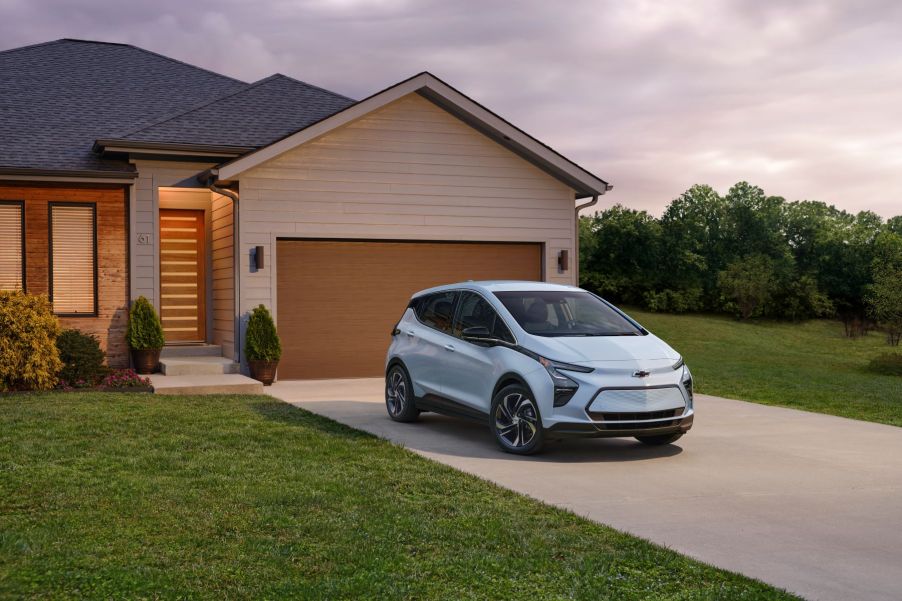
7 Non-Luxury Brands Without Any Plug-in Hybrid Electric Vehicles (PHEVs)
Several luxury automakers are making the move to electrification, with many using plug-in hybrid electric vehicles (PHEVs) as a stepping stone to electric vehicles (EVs). However, some non-luxury automakers are either slow to catch up or completely skipped PHEVs. Here are seven non-luxury automakers that currently don’t offer any PHEV model.
1. Chevrolet

The automaker General Motors’ push for electrification was signed by the launch of the Chevrolet Volt, the first plug-in hybrid in the U.S. that went on sale in 2010. However, this didn’t last long, as the last model year for the Volt was 2019. According to CNBC, General Motors has said that it plans to invest more than $20 billion in electric and self-driving vehicles by 2025, but it currently doesn’t have any PHEVs in its lineup. Today, Chevrolet only offers fully electric cars, with the Bolt EV and Bolt EUV, with upcoming electric versions of the Blazer, Equinox, and Silverado.
2. Dodge
Plug-in hybrid electric vehicles are coming soon to the Dodge brand, according to its parent company Stellantis. In a slideshow presentation to investors in February, the company said that a PHEV would join the Dodge lineup in 2023. As per The Detroit News, Tim Kuniskis, the chief executive officer of Dodge, has given credence to plans for the Dodge Hornet that debuted this summer. Beyond that, Stellantis has said it plans to introduce 10 PHEV models by 2025.
3. Honda
Honda was an early adopter of hybrid technology with the introduction of Insight in 1999, but the company has been slow to add PHEVs to its lineup. In fact, Honda briefly offered a PHEV model in the U.S., the CR-Z, but it was discontinued in 2016. Today, if you live in the U.S. and want a Honda PHEV, you can’t have one, although the company does offer the Accord Hybrid and Insight sedans, and the CR-V Hybrid SUV as an option. Although there’s no PHEV in the current lineup, Honda does have plans for an upcoming American electric Honda, the Prologue EV.
4. Mazda
Mazda’s “Sustainable Zoom-Zoom 2030” long-term vision for sustainable mobility includes plans for electric vehicles, but the automaker is missing a plug-in hybrid model in its lineup. In fact, Mazda doesn’t offer any hybrids at all. The automaker does have an EV on the market, the Mazda MX-30. The company has said that it plans to debut a new EV platform in North America by 2025.
5. Nissan
The first mass-market EV in the U.S. was the Nissan Leaf, which went on sale in 2010. Although Nissan has been an early adopter of electric vehicle technology, the company doesn’t offer a PHEV model. The only EVs currently in the Nissan lineup are the Leaf and the upcoming Ariya.
6. Ram
In 2010, Chrysler announced plans to produce a PHEV version of the Ram 1500 but never put the truck into production. Recently, in an announcement during the Stellantis E.V day celebration, Ram said that it would finally produce 1500 EV trucks to market by the end of 2024. Additionally, Ram said it would have a “fully electrified” lineup, including cargo vans, chassis cab trucks, and pickups by 2030.
7. Volkswagen
Volkswagen has been a leader in electric vehicle technology with its MEB platform that underpins the ID.3 and ID.4. However, while the company has EVs on the market, it doesn’t have any PHEV models in the U.S. VW has said it plans to phase out hybrids altogether in favor of EVs. The company has also said that it plans to have 22 million EVs on the road by 2030.


